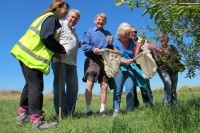Thank you to Bath University for this article which can also be read on their website!
http://www.bath.ac.uk/news/2014/11/13/ace-ukactive/
Research from our Department for Health on getting older people more active is included within a major report presented to government this week by the not-for-profit health body ukactive.
Their report, Steps to solving inactivity, is the largest review of physical activity programmes across Local Authorities to date, and suggests that much more needs to be done to capture and evaluate physical activity programme data in order to help with interventions.
ukactive’s first Local Authority report, Turning the tide of inactivity, for 2013-14 defined physical inactivity as a major national public health issue linked to one in six premature deaths. The latest report conducted the same research for 2014-15, highlighting potential interventions to stem inactivity.
In its analysis, the report draws on the challenges in getting the least active groups in society, including older people, more physically active. As part of its list of recommendations, the report highlights the successes achieved through the Active, Connected, Engaged (ACE) programme which targets older people and is led by researchers at Bath University, in collaboration with researchers at the Universities of Bristol, Birmingham and the West of England.
Project ACE was highlighted as one of only two out of 952 UK initiatives to be classified as a ‘promising practice’ according to stringent evaluation criteria, in the accompanying review of initiatives Identifying what works for local physical inactivity interventions, published by Public Health England.
Against a backdrop where long periods spent at home can also lead to feelings of loneliness among older people, the ACE programme shows how increased community involvement has the potential to reduce isolation and also reduce health risks from inactivity. This project is taking a unique approach to the problem, testing the effectiveness of peer volunteering as an effective way to encourage older people to take part in physical and social activities available in their communities.
As a low-cost and sustainable intervention, ACE has received positive feedback and has already been adopted by LinkAge, a Bristol-based organisation tackling loneliness and isolation in older people across the city, with a potential to roll it out across the country.
Project lead, Dr Afroditi Stathi from the Department for Health, explained: “ACE has provided evidence of its potential to have a significant impact on older people’s health and well-being. The unique thing about ACE is that it taps into resources that are available within the community. It is about getting the community to help itself.
“We will continue our successful collaboration with LinkAge and in the near future we envisage implementing ACE nationwide and further evaluating its impact on older people’s lives. Our next goal is to work closely with community organisations towards delivering ACE and providing robust scientific evidence, translating ACE from a ‘promising practice’ to a ‘proven practice’ in the next few years.”
According to ukactive’s report, 29 per cent of people in England are physically inactive, meaning they do less than 30 minutes of moderate physical activity per week. It calls for a more robust evaluation of physical activity programmes so the most effective can be commissioned and replicated with impact – a critical step in the fight to solve inactivity.
Commenting on the Steps to solving inactivty report, CEO of ukactive David Stalker said: “We’ve known for some time that we’re facing an uphill battle to reverse the inactivity trend and while the increase in funding represents a seismic shift in thinking amongst local authorities, building a sound evidence base to underpin the activity will be the ultimate difference between success and failure.”
The Prime Minister, the Rt Hon, David Cameron MP, added: “I welcome this report from ukactive as further evidence of the need to tackle physical inactivity. This is why the work of ukactive is so important. I am delighted that local authorities are leading the way by starting to prioritise physical activity services in their local areas and in accordance to the local needs of their residents. The Government has made it clear through our ‘Moving More, Living More’ initiative that departments will work together, with the Mayor of London’s teams, to embed physical activity into the DNA of the nation as part of the long term physical activity legacy from the 2012 Games.”

